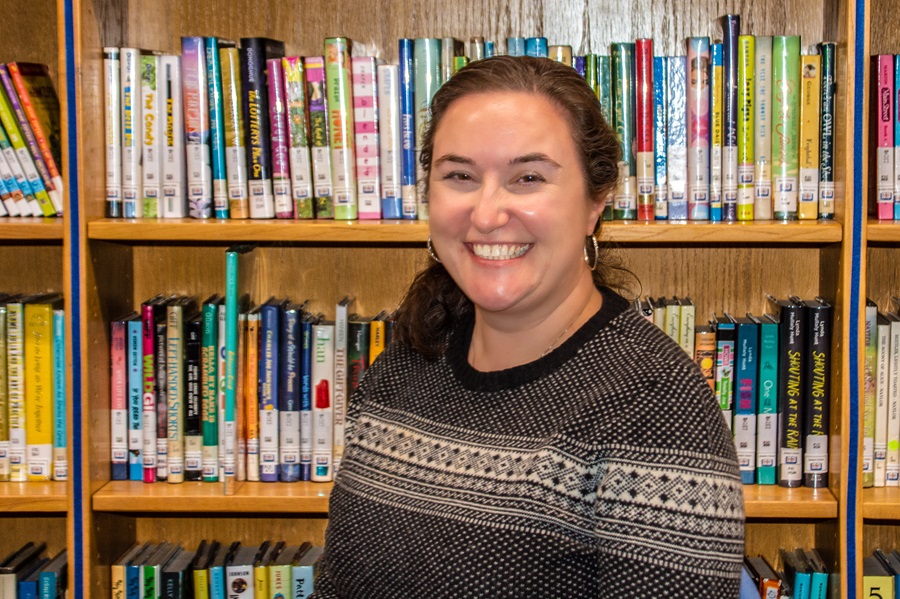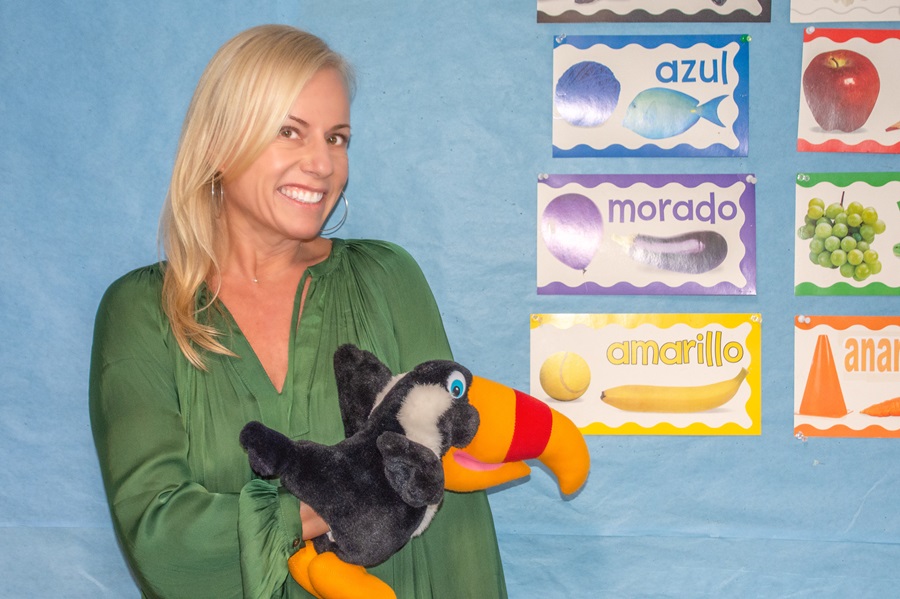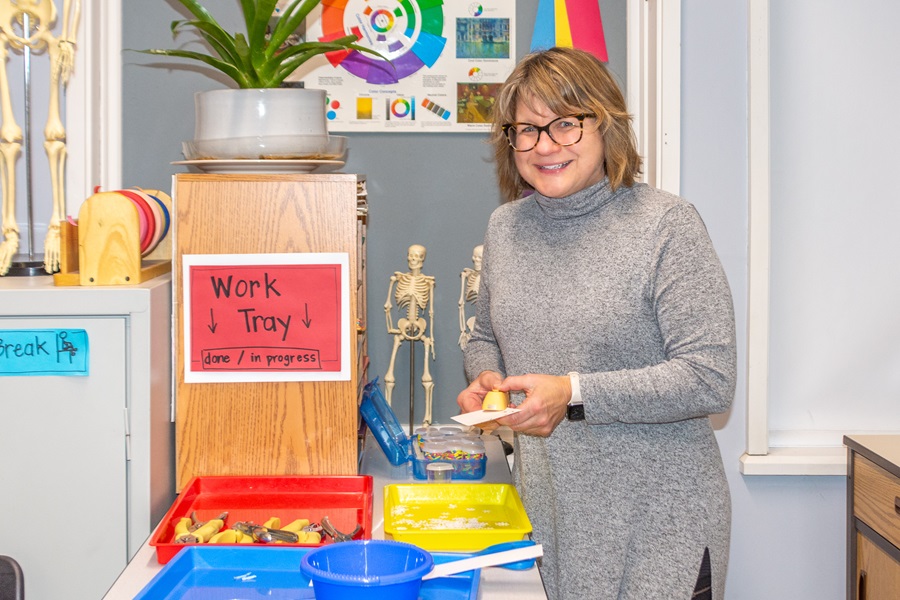TRURO — As a sixth-grader at Truro Central School in 1993, Abby Roderick drew a life-size portrait of herself in a billowing purple skirt, wielding a puppet in one hand and a book in the other. Her props represented the two things she dreamed of doing when she grew up: puppeteering and teaching.
Now, 30 years later, Roderick is the librarian and media specialist at that same school. She is one of several jacks-of-all-trades who keep the single-school district operating as its own sovereign educational entity.
Roderick began working at TCS in 2003 as a substitute teacher, advancing to educational assistant, then fourth-grade teacher, then sixth. For a while, she team-taught sixth grade and was also the school librarian. When sixth-grade enrollment dwindled to five students, then even fewer, her library duties took over full-time.

On a midwinter professional development day, the school staff split into two teams: specialists (including gym, Spanish, and music teachers) and the literacy team. Roderick is on both. She conducts reading interventions regularly, she says, and spends about 80 percent of her time outside the library.
Roderick went with the literacy team and leaned on her specialist colleagues to catch her up on what she missed. The atmosphere at the school makes juggling responsibilities possible, she said. She and her colleagues rely on one another for problem solving, strategizing, and resource sharing.
There are currently fewer than 100 students enrolled at Truro Central; this is the second time the student population has dipped that low.
With the exception of the two preschool classes, each grade level from kindergarten through fifth has one class with between 9 and 13 students. The state still recognizes TCS as a school for sixth-graders, though they have not mustered a class since the fall of 2021.
Despite its low enrollment overall, the range of students’ needs is still sweeping, according to Principal Patrick Riley, who has a background in music education.
“As someone who’s worked in a larger school district before, some of the challenges are trying to provide our students with the same opportunities as a district that has more resources,” Riley says.
The school needs an English language learning specialist, for instance, but not full time. Only two of the school’s 92 current students are at the ELL level, Riley says. TCS contracted a certified part-time ELL instructor to work with those students, though she’ll be going on maternity leave this year. Once that happens, unless someone new applies, ELL instruction will be added to the plate of an existing staff member. In the past, Spanish teacher Alison Waldo has taken on that job.

TCS has also contracted with Gosnold Behavioral Health, which sends a counselor to meet with students two days per week. Those referrals can come from school staff or students’ primary-care doctors, and families arrange it, but the counseling is school-based, Riley says.
The school also contracts through the Cape Cod Collaborative for the services of occupational and physical therapists who come two days per week. The occupational therapist meets with 27 students (in groups, individually, and in classes), Riley says, and the physical therapist works one-on-one with five students while also facilitating motor groups with the preschool classes.
“The expectations of any district are the same, no matter what size you are,” Riley says. “For a small district like ours, a one-school district, to meet those expectations requires us to take on different responsibilities” than a teacher in a larger district would.
A total of 45 staff members, including full-time, part-time, and contract employees, keep the gears turning at the school, Riley says. The school is fully staffed, including a maintenance crew of two who handle custodial duties and general building upkeep. Aside from a few specific certifications, like ELL, the school has had a lot of success with recruitment and retention, Riley says.
Every day, students leave their regular classrooms for special classes like music, science, and art — each of which they attend twice weekly. This year, Stacey Klimkosky teaches both science and art: “two loves of mine,” she says.

The dual responsibility was Klimkosky’s idea. When she learned that a former colleague, art teacher Kim Possee, was retiring, Klimkosky was teaching only science. But “even when I taught only science, I was always incorporating art,” she says, recalling the garden of perennials and annuals she grew last year with the help of a Cape Cod 5 educational mini-grant. Students spent time there learning about zinnias and evergreens and then drawing them.
“Science is all about observing, and so is art,” Klimkosky says. Now she is working her way through a Mass. Dept. of Elementary and Secondary Education program with the New Arts Teacher Mentoring Network to elevate her state certification in visual art instruction from the preliminary to the professional level.
Klimkosky, who grew up in Bethany, Conn., is one of several teachers at the school who hold multiple licenses. She earned a master’s degree in early childhood education (and before that, in college administration) before she was brought on as an educational assistant at TCS in 2003. She has gone on to earn a certificate in elementary education (grades one through six) and then another in library teaching (K-12).
Klimkosky preceded Roderick as the school’s librarian. And during the pandemic-tainted 2020-21 school year, when TCS needed an in-person preschool teacher, Klimkosky took that on. That year, science instruction was woven into the classroom teachers’ curricula. “It ended up being one of my favorite years of teaching,” Klimkosky says.
When it comes to teaching, “people think you’re doing the same job on day one as you’re doing when you retire,” Riley says. Instead, it’s a job that allows for a lot of different experiences.
True to her sixth-grade dream, Roderick earned her undergraduate degree in puppetry. In a job that’s included helping with after-school programs and teaching social studies, technology, and in grades classrooms, all while working as the school librarian, her career looks much like she hoped it would when she penned that self-portrait in sixth grade. She goes to work, it seems, with a puppet on one hand and a book in the other.



